同位语从句 课件 (29张ppt)
图片预览
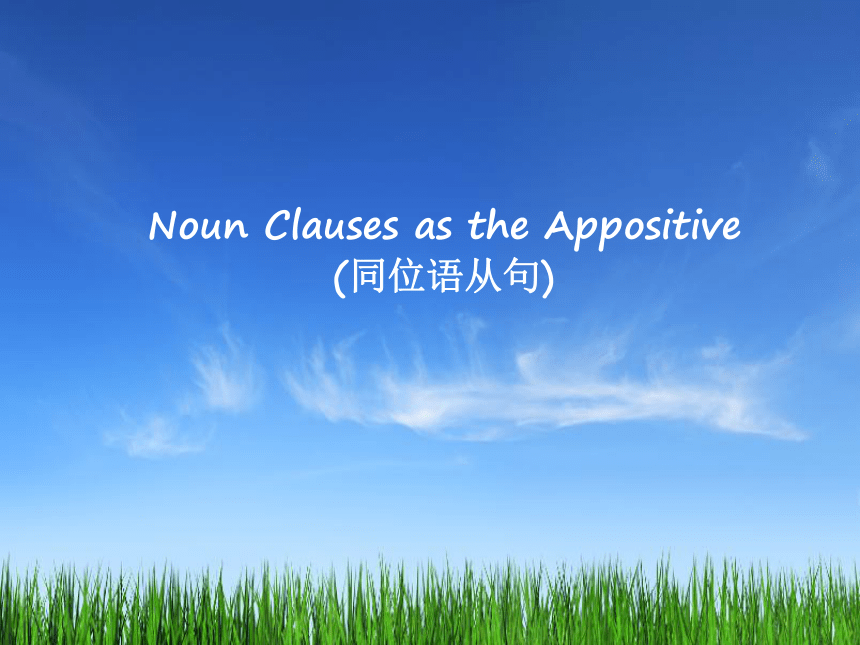
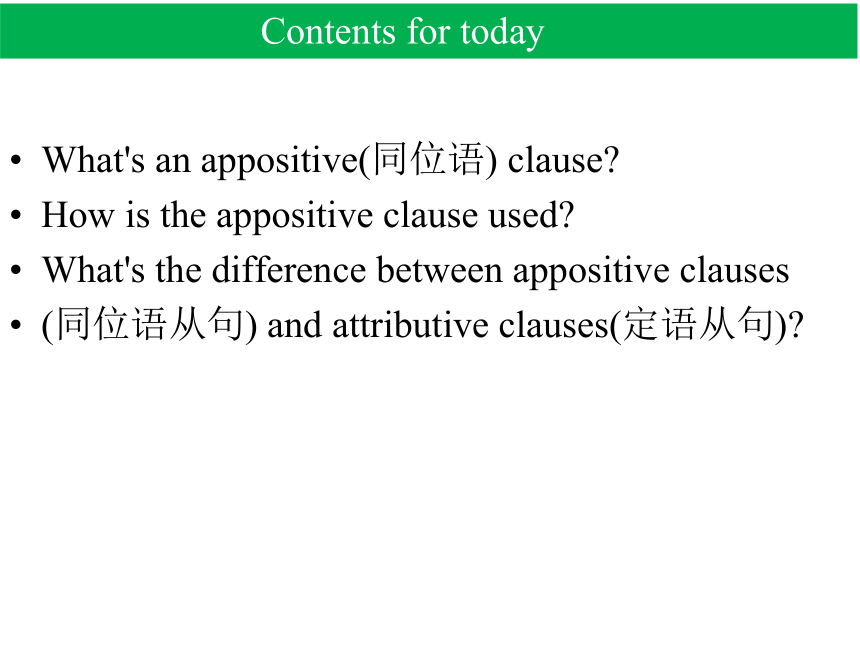
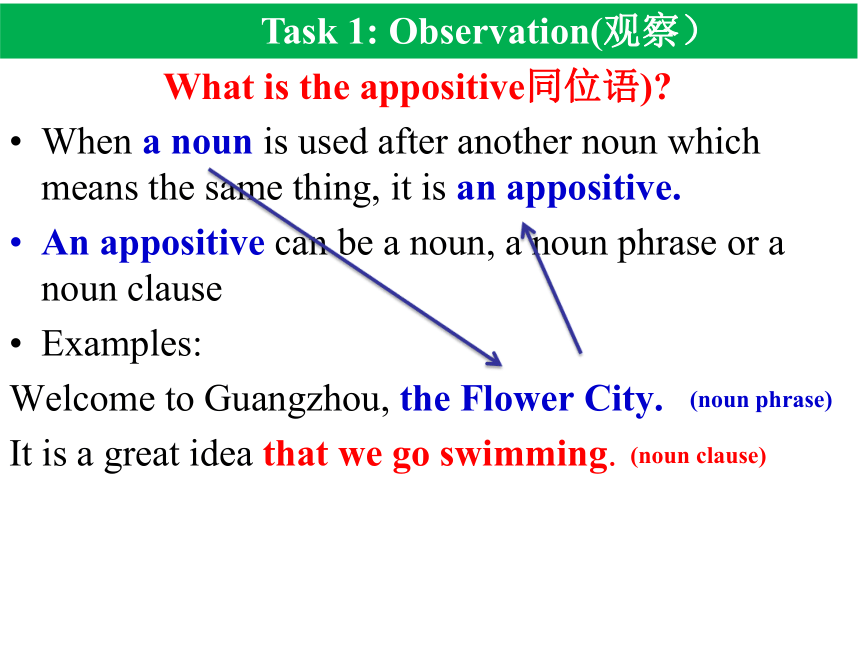
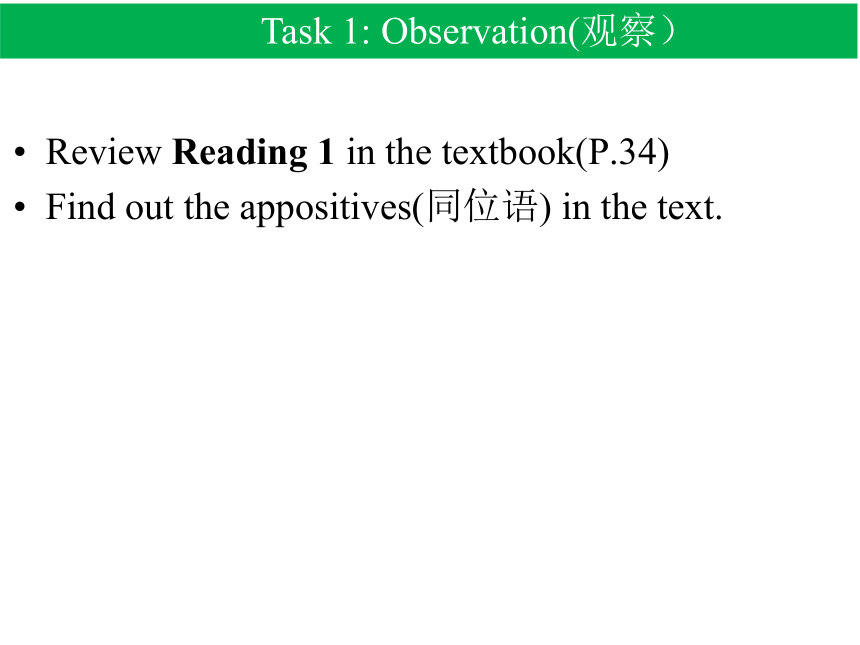
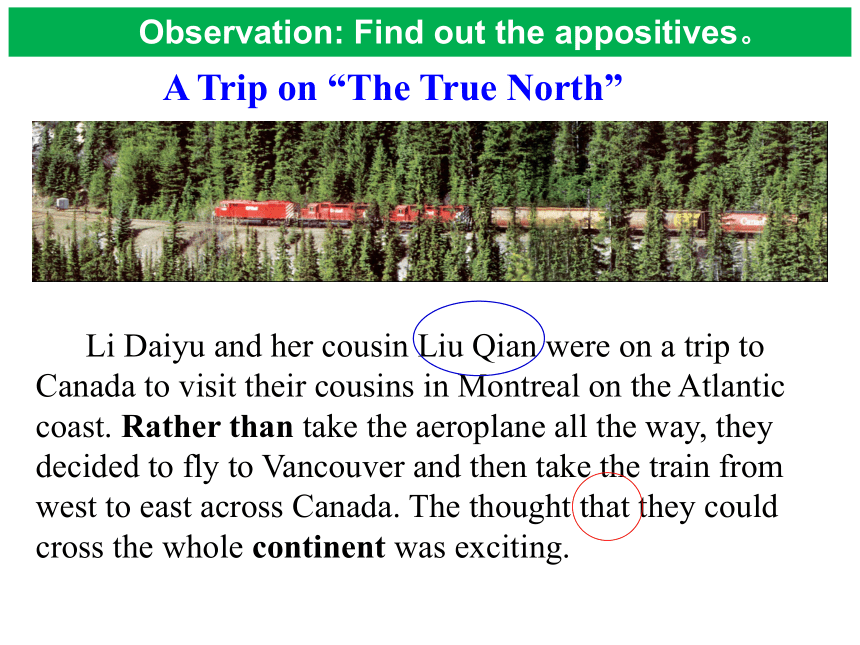
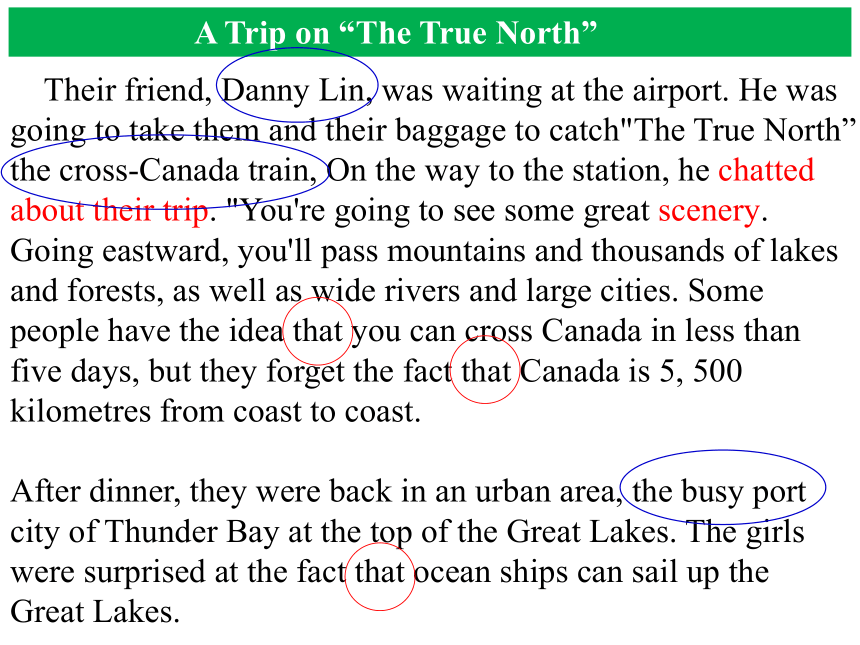
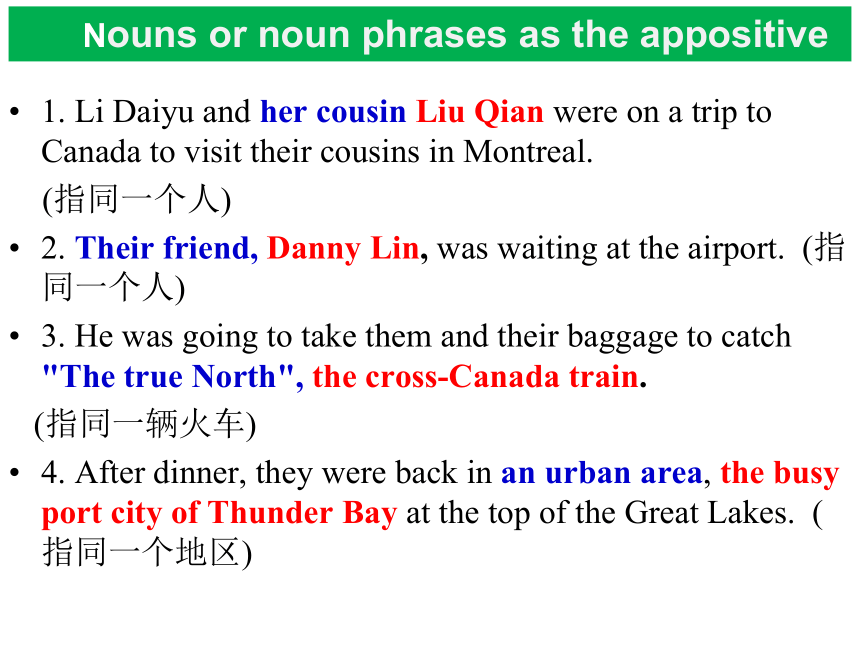
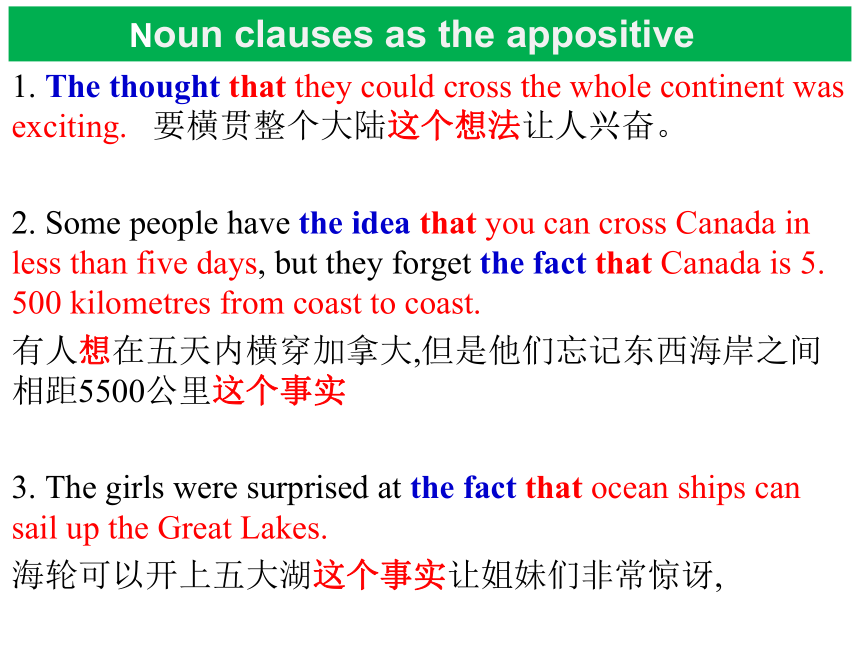
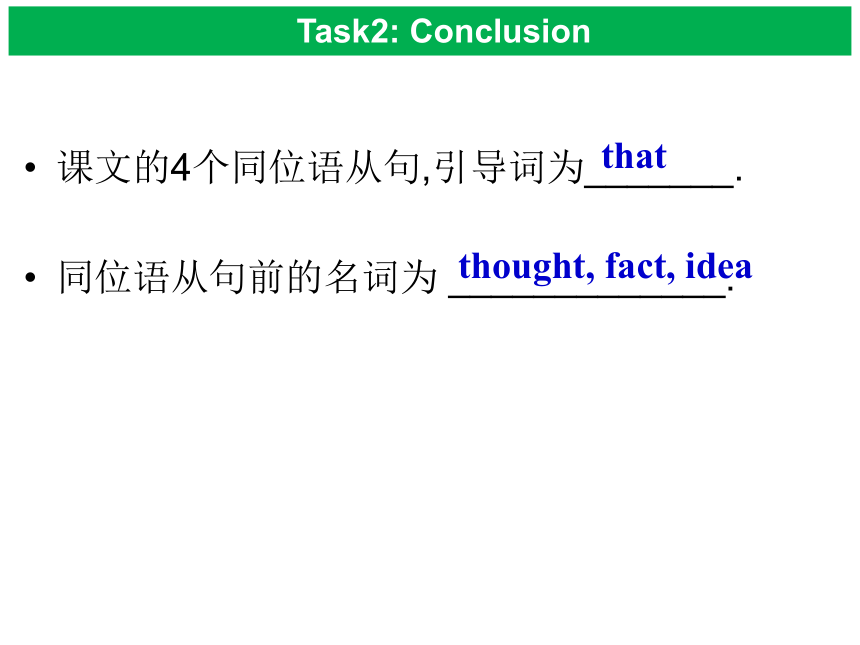
文档简介
(共29张PPT)
Noun Clauses as the Appositive
(同位语从句)
What's an appositive(同位语) clause
How is the appositive clause used
What's the difference between appositive clauses
(同位语从句) and attributive clauses(定语从句)
Contents for today
What is the appositive同位语)
When a noun is used after another noun which means the same thing, it is an appositive.
An appositive can be a noun, a noun phrase or a noun clause
Examples:
Welcome to Guangzhou, the Flower City.
It is a great idea that we go swimming.
Task 1: Observation(观察)
(noun phrase)
(noun clause)
Review Reading 1 in the textbook(P.34)
Find out the appositives(同位语) in the text.
Task 1: Observation(观察)
A Trip on “The True North”
Observation: Find out the appositives。
Li Daiyu and her cousin Liu Qian were on a trip to Canada to visit their cousins in Montreal on the Atlantic coast. Rather than take the aeroplane all the way, they decided to fly to Vancouver and then take the train from west to east across Canada. The thought that they could cross the whole continent was exciting.
Their friend, Danny Lin, was waiting at the airport. He was
going to take them and their baggage to catch"The True North”
the cross-Canada train, On the way to the station, he chatted about their trip. "You're going to see some great scenery. Going eastward, you'll pass mountains and thousands of lakes and forests, as well as wide rivers and large cities. Some people have the idea that you can cross Canada in less than five days, but they forget the fact that Canada is 5, 500 kilometres from coast to coast.
After dinner, they were back in an urban area, the busy port city of Thunder Bay at the top of the Great Lakes. The girls were surprised at the fact that ocean ships can sail up the Great Lakes.
A Trip on “The True North”
1. Li Daiyu and her cousin Liu Qian were on a trip to Canada to visit their cousins in Montreal.
(指同一个人)
2. Their friend, Danny Lin, was waiting at the airport. (指同一个人)
3. He was going to take them and their baggage to catch "The true North", the cross-Canada train.
(指同一辆火车)
4. After dinner, they were back in an urban area, the busy port city of Thunder Bay at the top of the Great Lakes. (指同一个地区)
Nouns or noun phrases as the appositive
1. The thought that they could cross the whole continent was exciting. 要橫贯整个大陆这个想法让人兴奋。
2. Some people have the idea that you can cross Canada in less than five days, but they forget the fact that Canada is 5. 500 kilometres from coast to coast.
有人想在五天内横穿加拿大,但是他们忘记东西海岸之间相距5500公里这个事实
3. The girls were surprised at the fact that ocean ships can sail up the Great Lakes.
海轮可以开上五大湖这个事实让姐妹们非常惊讶,
Noun clauses as the appositive
课文的4个同位语从句,引导词为_______.
同位语从句前的名词为 _____________.
Task2: Conclusion
that
thought, fact, idea
Learn the grammar rules of appositive clauses.
Finish exercises with appositive clauses.
Task 3: Discovery(发现)
1.形式:同位语从句属于名词性从句,常常跟在fact,news,idea, thought, question, reply, report, remark 评论, hope, belief 等抽象名词后面。
2.含义:同位语从句一般用来解释或说明这些名词的具体含义或内容,在逻辑上表现为同位关系。
3.引导词:大部分同位语从句由从属连词that引导,其他引导词包括从属连词 whether (不能用if), 连接代词who/ what/ which,连接副词when/ where/why/how。
Appositive clauses 同位语从句
that, whether(只起连接作用,不作成分)
1. There is no doubt that the earth is round.
2. I have some doubt whether he really knows me.
3. The idea that computers can recognize human voices surprises many people.
从属连词 that & whether
(引导词在从句中作成分)
1. The question who should go abroad requires consideration.
2. I have no idea which one I should choose.
3. I have no idea what I should choose.
4. I have no idea when she comes back.
5. I have no idea where she will go.
6. He refused to answer the question how he got the news.
连接代词who, which,what
连接副词 where,when, how, why
1.为了保持句子平衡,同位语从句有时候被别的词把它和名词隔开.
1.The story goes that William won the game by pure luck.
2.Word came that our team had won the game.
3.Suddenly the thought came to him that he
could go blind.
注意
2.若被同位语说明的名词是表示建议(如 advice, suggestion, proposal)、要求(如 demand, request, requirement)、命令(如 order)时,同位语从句中的谓语用“ should+动词原型”).
He made the suggestion that we (should) start at once.
Soon we received the order that we (should) stop fighting at once.
注意
Turn to page 37 of the text book.
Finish exercise 2.
Task 4: Practice
1. The possibility that the weather in winter would be warm pleased the Canadians.
2. The idea that there will be an earthquake terrifies many people.
3. The hope that we could go to France was exciting.
4. The fact that more and more people settle down in Canada surprises me.
5. The belief that the world is flat is not scientic .
Suggested answers to Ex 2 on page 37
1. My parents have a wish 我能过上幸福生活.
2. I always hold the belief 熟能生巧.
3. There is some doubt 我们能帮他做些什么.
4 We have no idea 什么时候会出结果.
Sentence making
1. My parents have a wish ____________________.
2. I always hold the belief ____________________.
3. There is some doubt ______________________.
4 We have no idea _________________________.
Sentence making
that I can live a happy life
practice makes perfect
what we can do to help him
when the result will come out
Let's tell the difference between appositive clauses
(同位语从句)and attributive clauses (定语从句).
(This task is quiet difficult)
Task 5: Comparison(比较)
1) The news that you heard is not true.
你听到的消息不真实。
(定语从句:对先行词news起修饰、限制的作用
2)The news that our team has won is true
我们队获胜这个消息是真的。
(同位语从句:具体说明它前面的名词news的内容)
同位语从句与定语从句区别(1)
3)The fact (that) we talked about is very important.
我们所谈论的事实是非常重要的
(定于从句:that 在从句中担任句子成分,是关系词。当充当从句的宾语时可省略。
4)The fact that we succeeded pleased everybody
我们成功了,这一事实让大家很高兴
(同位语从句:that在同位语从句中不担任句子成分,是从属连词,通常不能省略)
同位语从句与定语从句区别(2)
1) They expressed the hope that they would come to visit China again.
同位语从句: that they would come to visit China对hope进行具体的说明。
2)The hope (that) she expressed is that they would come to visit China again.
定语从句:从句修饰hope,而先行词hope在定从中充当 expressed的宾语,可以省略。
Have a try
3) The order that we should send a few people to help
the other groups was received yesterday.
同位语从句:从句对 order的具体解释,that虽不作成分,但不能省略。
4)The order(that) we received yesterday was that we should send a few people to help the other groups.
定语从句:从句是名词 order的修饰语,tha在从作 received的宾语,可以省略.
Try again
同位语从句Vs定语从句(小结)
1.The news was very exciting _____our class had won the football match.
2. I have no idea _____he will come back.
3. We'll discuss the problem____the sports meeting will be held on time.
4. Nobody can explain the mystery _____he suddenly left without saying a word.
5. Jay left a word with my secretary_____he would call again in the afternoon
6. We are glad at the news___he told us
Task 5: Consolidation(巩固练习)
that
when/whether
whether
why
that
(that)
Try to introduce yourself using Noun Clauses.
Homework
My name is …, I am happy to introduce myself to you. 我最喜欢的是运动和英语 (主语从句),我也喜欢交朋友和乐于助人。在我看来,生活中的成功主要取决于是否能与他人融洽相处(宾语从句 ),我确信我能成为你们的好朋友( 宾语从句 ) 。 众所周知,有明确目标
(a settled purpose)的人一定会成功(主语从句),我的愿望是被我梦想中的重点大学录取,(表语从句)可是事实是我的成绩不是很理想(同位从句)使我父母很失望。总之,我必须努力来实现我的梦想。
参考信息:
My name is…what I like most are sports and English. And I like making friends and I am ready to help others. In my opinion, success in life depends mainly on whether one can get along well with others. I’m sure that I can be your good friend. It is known that a man who has a settled purpose will surely succeed. My hope is that I can be admitted to a key university I’m dreaming of. However, the fact that I don’t do well in study makes my parents disappointed. All in all, I will make efforts to make my dream come true.
Noun Clauses as the Appositive
(同位语从句)
What's an appositive(同位语) clause
How is the appositive clause used
What's the difference between appositive clauses
(同位语从句) and attributive clauses(定语从句)
Contents for today
What is the appositive同位语)
When a noun is used after another noun which means the same thing, it is an appositive.
An appositive can be a noun, a noun phrase or a noun clause
Examples:
Welcome to Guangzhou, the Flower City.
It is a great idea that we go swimming.
Task 1: Observation(观察)
(noun phrase)
(noun clause)
Review Reading 1 in the textbook(P.34)
Find out the appositives(同位语) in the text.
Task 1: Observation(观察)
A Trip on “The True North”
Observation: Find out the appositives。
Li Daiyu and her cousin Liu Qian were on a trip to Canada to visit their cousins in Montreal on the Atlantic coast. Rather than take the aeroplane all the way, they decided to fly to Vancouver and then take the train from west to east across Canada. The thought that they could cross the whole continent was exciting.
Their friend, Danny Lin, was waiting at the airport. He was
going to take them and their baggage to catch"The True North”
the cross-Canada train, On the way to the station, he chatted about their trip. "You're going to see some great scenery. Going eastward, you'll pass mountains and thousands of lakes and forests, as well as wide rivers and large cities. Some people have the idea that you can cross Canada in less than five days, but they forget the fact that Canada is 5, 500 kilometres from coast to coast.
After dinner, they were back in an urban area, the busy port city of Thunder Bay at the top of the Great Lakes. The girls were surprised at the fact that ocean ships can sail up the Great Lakes.
A Trip on “The True North”
1. Li Daiyu and her cousin Liu Qian were on a trip to Canada to visit their cousins in Montreal.
(指同一个人)
2. Their friend, Danny Lin, was waiting at the airport. (指同一个人)
3. He was going to take them and their baggage to catch "The true North", the cross-Canada train.
(指同一辆火车)
4. After dinner, they were back in an urban area, the busy port city of Thunder Bay at the top of the Great Lakes. (指同一个地区)
Nouns or noun phrases as the appositive
1. The thought that they could cross the whole continent was exciting. 要橫贯整个大陆这个想法让人兴奋。
2. Some people have the idea that you can cross Canada in less than five days, but they forget the fact that Canada is 5. 500 kilometres from coast to coast.
有人想在五天内横穿加拿大,但是他们忘记东西海岸之间相距5500公里这个事实
3. The girls were surprised at the fact that ocean ships can sail up the Great Lakes.
海轮可以开上五大湖这个事实让姐妹们非常惊讶,
Noun clauses as the appositive
课文的4个同位语从句,引导词为_______.
同位语从句前的名词为 _____________.
Task2: Conclusion
that
thought, fact, idea
Learn the grammar rules of appositive clauses.
Finish exercises with appositive clauses.
Task 3: Discovery(发现)
1.形式:同位语从句属于名词性从句,常常跟在fact,news,idea, thought, question, reply, report, remark 评论, hope, belief 等抽象名词后面。
2.含义:同位语从句一般用来解释或说明这些名词的具体含义或内容,在逻辑上表现为同位关系。
3.引导词:大部分同位语从句由从属连词that引导,其他引导词包括从属连词 whether (不能用if), 连接代词who/ what/ which,连接副词when/ where/why/how。
Appositive clauses 同位语从句
that, whether(只起连接作用,不作成分)
1. There is no doubt that the earth is round.
2. I have some doubt whether he really knows me.
3. The idea that computers can recognize human voices surprises many people.
从属连词 that & whether
(引导词在从句中作成分)
1. The question who should go abroad requires consideration.
2. I have no idea which one I should choose.
3. I have no idea what I should choose.
4. I have no idea when she comes back.
5. I have no idea where she will go.
6. He refused to answer the question how he got the news.
连接代词who, which,what
连接副词 where,when, how, why
1.为了保持句子平衡,同位语从句有时候被别的词把它和名词隔开.
1.The story goes that William won the game by pure luck.
2.Word came that our team had won the game.
3.Suddenly the thought came to him that he
could go blind.
注意
2.若被同位语说明的名词是表示建议(如 advice, suggestion, proposal)、要求(如 demand, request, requirement)、命令(如 order)时,同位语从句中的谓语用“ should+动词原型”).
He made the suggestion that we (should) start at once.
Soon we received the order that we (should) stop fighting at once.
注意
Turn to page 37 of the text book.
Finish exercise 2.
Task 4: Practice
1. The possibility that the weather in winter would be warm pleased the Canadians.
2. The idea that there will be an earthquake terrifies many people.
3. The hope that we could go to France was exciting.
4. The fact that more and more people settle down in Canada surprises me.
5. The belief that the world is flat is not scientic .
Suggested answers to Ex 2 on page 37
1. My parents have a wish 我能过上幸福生活.
2. I always hold the belief 熟能生巧.
3. There is some doubt 我们能帮他做些什么.
4 We have no idea 什么时候会出结果.
Sentence making
1. My parents have a wish ____________________.
2. I always hold the belief ____________________.
3. There is some doubt ______________________.
4 We have no idea _________________________.
Sentence making
that I can live a happy life
practice makes perfect
what we can do to help him
when the result will come out
Let's tell the difference between appositive clauses
(同位语从句)and attributive clauses (定语从句).
(This task is quiet difficult)
Task 5: Comparison(比较)
1) The news that you heard is not true.
你听到的消息不真实。
(定语从句:对先行词news起修饰、限制的作用
2)The news that our team has won is true
我们队获胜这个消息是真的。
(同位语从句:具体说明它前面的名词news的内容)
同位语从句与定语从句区别(1)
3)The fact (that) we talked about is very important.
我们所谈论的事实是非常重要的
(定于从句:that 在从句中担任句子成分,是关系词。当充当从句的宾语时可省略。
4)The fact that we succeeded pleased everybody
我们成功了,这一事实让大家很高兴
(同位语从句:that在同位语从句中不担任句子成分,是从属连词,通常不能省略)
同位语从句与定语从句区别(2)
1) They expressed the hope that they would come to visit China again.
同位语从句: that they would come to visit China对hope进行具体的说明。
2)The hope (that) she expressed is that they would come to visit China again.
定语从句:从句修饰hope,而先行词hope在定从中充当 expressed的宾语,可以省略。
Have a try
3) The order that we should send a few people to help
the other groups was received yesterday.
同位语从句:从句对 order的具体解释,that虽不作成分,但不能省略。
4)The order(that) we received yesterday was that we should send a few people to help the other groups.
定语从句:从句是名词 order的修饰语,tha在从作 received的宾语,可以省略.
Try again
同位语从句Vs定语从句(小结)
1.The news was very exciting _____our class had won the football match.
2. I have no idea _____he will come back.
3. We'll discuss the problem____the sports meeting will be held on time.
4. Nobody can explain the mystery _____he suddenly left without saying a word.
5. Jay left a word with my secretary_____he would call again in the afternoon
6. We are glad at the news___he told us
Task 5: Consolidation(巩固练习)
that
when/whether
whether
why
that
(that)
Try to introduce yourself using Noun Clauses.
Homework
My name is …, I am happy to introduce myself to you. 我最喜欢的是运动和英语 (主语从句),我也喜欢交朋友和乐于助人。在我看来,生活中的成功主要取决于是否能与他人融洽相处(宾语从句 ),我确信我能成为你们的好朋友( 宾语从句 ) 。 众所周知,有明确目标
(a settled purpose)的人一定会成功(主语从句),我的愿望是被我梦想中的重点大学录取,(表语从句)可是事实是我的成绩不是很理想(同位从句)使我父母很失望。总之,我必须努力来实现我的梦想。
参考信息:
My name is…what I like most are sports and English. And I like making friends and I am ready to help others. In my opinion, success in life depends mainly on whether one can get along well with others. I’m sure that I can be your good friend. It is known that a man who has a settled purpose will surely succeed. My hope is that I can be admitted to a key university I’m dreaming of. However, the fact that I don’t do well in study makes my parents disappointed. All in all, I will make efforts to make my dream come true.
